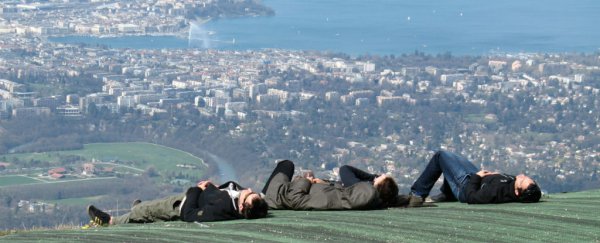The link between sleeping and forming memories has already been well-established, but new research suggests that a 10-minute break from work could be just as effective as a nap when it comes to cementing memories relating to space and environment inside our brains.
"A lot of people think the brain is a muscle that needs to be continually stimulated, but perhaps that's not the best way," lead researcher Michaela Dewar from Heriot-Watt University in Edinburgh told New Scientist. Think about staring at a textbook the night before an exam and feeling like nothing's going in - Dewar and her colleagues hypothesise that a few minutes' break could be more effective at helping that knowledge take root in your mind.
Dewar and her colleagues asked 40 young people to find a route through a virtual reality environment before either taking a break or completing an unrelated perceptual task for the next 10 minutes. Those who were given a time-out were 10 percent more accurate at orientating themselves in the virtual environment afterwards, based on landmarks they'd already seen.
The research, published in the journal Hippocampus, relates to spatial memories. Previous research published by Dewar in 2012 had already highlighted a link between brief periods of rest and being better able to remember the details of a story, even up to a week afterwards. Although the sample size of the new study is small, the results point to the possibility that the brain also benefits from a time-out as far as forming spatial memories is concerned.
And that could have an impact on the treatment of people with memory or sleep disorders, according to the University of York's Gareth Gaskell. "As long as you're reasonably relaxed, you might still be experiencing some of the memory-consolidation processes that sleep would normally do," he told Jessica Hamzelou at New Scientist. "It is very surprising and exciting. If we can understand how this takes place, we could help people with amnesia."
When Dewar tried her test with a group of people with amnesia back in 2009, the difference was even more striking. With a short 'brain break', participants were able to recall between 30 and 80 percent of the words in a list. Without that break, 8 out of the 12 individuals were unable to recall anything.
The key in each of these studies is removing all forms of stimuli from the brain without actually falling asleep.
Of course, while sleep is an integrated part of our routine that we can't live without, finding space to quietly think about nothing in particular isn't always easy. But if you can schedule yourself some downtime, the benefits are likely to go beyond spatial memory consolidation - Ferris Jabr over at Scientific American has a detailed analysis of studies looking at how brain downtime can boost productivity, creativity, and attention spans, which suggests it's certainly worth a try.
